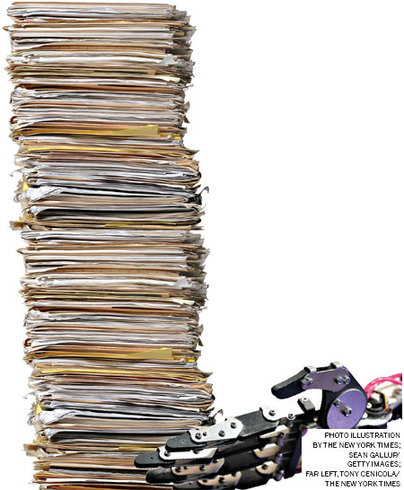Society
Looks like a job for an e-lawyer
Updated: 2011-03-13 07:57
By John Markoff (New York Times)
When five television studios became entangled in a United States Justice Department antitrust lawsuit against the CBS network, the cost was immense. As part of the obscure task of "discovery" - providing documents relevant to a lawsuit - the studios examined six million documents at a cost of more than $2.2 million, much of it to pay for a platoon of lawyers and paralegals who worked for months at high hourly rates.
 |
But that was in 1978. Now, thanks to advances in artificial intelligence, "e-discovery" software can analyze documents in a fraction of the time for a fraction of the cost. In January, for example, Blackstone Discovery of Palo Alto, California, helped analyze 1.5 million documents for less than $100,000.
Some programs go beyond just finding documents with relevant terms at computer speeds. They can extract relevant concepts - like documents pertaining to social protest in the Middle East - even in the absence of specific terms, and deduce patterns of behavior that might have eluded lawyers.
"From a legal staffing viewpoint, it means that a lot of people who used to be allocated to conduct document review are no longer able to be billed out," said Bill Herr, who was a lawyer at a major chemical company.
Computers are getting better at mimicking human reasoning and they are claiming work once done by people in high-paying professions. The number of computer chip designers, for example, has largely stagnated because powerful software programs replace the work once done by legions of logic designers.
Software is also making its way into tasks that were the exclusive province of human decision makers, like loan and mortgage officers and tax accountants.
"People get bored, people get headaches," Mr. Herr said. "Computers don't."
These new forms of automation have renewed the debate over the economic consequences of technology.
David H. Autor, an economics professor at the Massachusetts Institute of Technology, says the United States economy is being "hollowed out." New jobs, he said, are coming at the bottom of the economic pyramid, jobs in the middle are being lost to automation and outsourcing, and now job growth at the top is slowing because of automation.
"The economic impact will be huge," said Tom Mitchell, chairman of the machine learning department at Carnegie Mellon University in Pittsburgh. "We're at the beginning of a 10-year period where we're going to transition from computers that can't understand language to a point where computers can understand quite a bit about language."
The most basic e-discovery technologies use specific search words to find and sort relevant documents. More advanced programs filter documents through a large web of word and phrase definitions. Software that takes a sociological approach can mimic the deductive powers of Sherlock Holmes.
Cataphora, an information-sifting company in Silicon Valley, has its software mine documents for the activities and interactions of people. The computer pounces on the "digital anomalies" that white-collar criminals create in trying to hide their activities.For example, the software can find "call me" moments - those incidents when an employee decides to hide a particular action by having a private conversation.
"It's a means of showing who leaked information, who's influential in the organization or when a sensitive document like an S.E.C. filing is being edited an unusual number of times, or an unusual number of ways, by an unusual type or number of people," said Elizabeth Charnock, Cataphora's founder.
The software can also detect subtle changes in the style of an e-mail communication. "You tend to split a lot fewer infinitives when you think the F.B.I. might be reading your mail," said Steve Roberts, Cataphora's chief technology officer.
Such tools owe a debt to an unlikely, though appropriate, source: the electronic mail database known as the Enron Corpus.
In October 2003, Andrew McCallum, a computer scientist at the University of Massachusetts, Amherst, read that the federal government had a collection of more than five million messages from the prosecution of Enron Corporation.
He bought a copy of the database for $10,000 and made it freely available to academic and corporate researchers. Since then, it has become the foundation of a wealth of new science - and its value has endured, since privacy constraints usually keep large collections of e-mail out of reach.
The Enron Corpus has led to a better understanding of how language is used and how social networks function.
Some specialists acknowledge that the technology has limits. "The documents that the process kicks out still have to be read by someone," said Herbert L. Roitblat of OrcaTec, a consulting firm in Atlanta.
Quantifying the employment impact of these new technologies is difficult. Mike Lynch, the founder of Autonomy, a British e-discovery firm, estimated that the shift from manual document discovery to e-discovery would lead to a manpower reduction in which one lawyer would suffice for work that once required 500 and that the newest generation of software, which can detect duplicates and find clusters of important documents on a particular topic, could cut the head count by another 50 percent.
The computers seem to be good at their new jobs. Mr. Herr used e-discovery software to reanalyze work his company's lawyers did in the 1980s and '90s. His human colleagues had been only 60 percent accurate, he found.
"Think about how much money had been spent to be slightly better than a coin toss," he said.
The New York Times
E-paper

Factory fever
Despite auto manufacturing bubble scare, car giants gear up expansion of factories.
Dressed for success
Fabric of change
High spirits
Specials

Earthquake Hits Japan
A massive 8.8 magnitude quake hit the northeast coast of Japan on March 11,2011.

NPC & CPPCC sessions
Lawmakers and political advisers gather in Beijing to discuss major issues.

Panda campaign
Black-and-white bear helps Chengdu in marketing campaign after quake.
